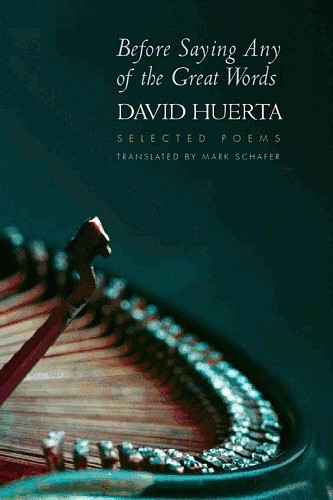
This piece is about 5 printed pages long.
It is copyright © Mark Schafer, David Huerta and Jacket magazine 2007.

These translations come from my anthology of Huerta’s poetry, Before Saying Any of the Great Words: Selected Poetry of David Huerta, 1972–2003, published by Copper Canyon Press in 2009. The collection includes these translations along with those of 83 more of Huerta’s poems, selected from twelve of his nineteen collections, and the original Spanish poems. The book has a new website, http://www.beforesaying.com/, which contains more poems, translations,stories, audio, and video. These translations were supported by a Translation Fellowship from the National Endowment for the Arts and by the Banff International Centre for Literary Translation.
David Huerta is considered by critics to be one of Mexico’s major living poets. This judgment was confirmed in February of 2006 when Huerta was awarded the Xavier Villarrutia Prize, Mexico’s most prestigious literary award, by a unanimous vote of the jury for his four decades of poetic production. Other awards given Huerta include the Diana Moreno Toscano Prize (1972), a Guggenheim Fellowship (1978), and the Carlos Pellicer Prize (1990). Huerta’s poetry has been translated into French, Portuguese, Finnish, and Polish, in addition to English.
— Mark Schafer
The Desert
May no one forget the radiance of the
desert.
May the sands sleep in the embers of time.
The
mountains, the wounded bodies,
the memories, the ruins
remained
in the desert’s solitude.
May every wound glisten
and
every kiss seal again the red face of the sky.
May prayer and
revilement,
shame and delight
be tinged with the energy of the
desert.
May you always have to hear the murmur
of blood in the
Plaza.
The broken red sky,
the hands dripping with dark
sorrow:
signs of the desert at the moment it kindles
its dawns
and its vibrations.
May the mouths be empty of anyone or
anything.
May everyone
be placed in the copious
shadow...
may everything be moistened
by the ancient light of
Resurrection.
May everything be contained in the flight of this
earth,
everything in the magic of presences
— the cats
and the vultures,
the dogs and iguanas,
the wastelands and the
gardens,
the sleeping hyacinth, the erect spikenard
May
the desert appear and disappear,
in a naked rhythm, through the hours and
the days
— the hours filed down by the days,
the days
gnawed away by the years
Song of Unease
Unease in the ochre-filled skies, unease in the
silky
labyrinth of the gut, unease
in the artist’s double,
triple nibs,
unease among the cornfields and the rosaries
fingered
nervously
by the fat-bottomed woman and her familiars,
unease in the
water
with its face of transparency and mud
and in the blue organs of
the wind, unease
in the nearness of insects and before the wings
of
the ashen curlew, unease in the jug
and in the cup, unease within the four
walls of the house
and in the open air, unease to the south
and to the
north of the slightly stained compass,
unease in the strain of the
equator
that cradles the womb with sublime force
between the west of
defecation and the east of urine,
unease in the varnished genitals of what
oughtn’t,
unease by the major streams and minor gullies,
unease
on the shaven skull of the skeleton
and under the strident hairs of the
sepia sketch,
unease in the shimmering mask of the gods
and on the
round or filthy face of the buttocks,
unease of the bodies and souls by the
side of the road
and in the bristling intimacy of the
bathrooms.
Fruit
The fruit
descends
like a chapter of lightening:
Purified
light,
fertile in its volume
of vein
and
juice,
of peel and gleaming.
The fruit fills
the
shadow burn
of your hand.
Shadow of transfixed
and curved
delight.
Here, then, is the fruit,
its
grams
stripped bare,
in the Sun of a hand.
What I See
I see the mirrors of the Spirit
snagged
on the dark lip of
virtue.
I see clusters of impacts
secreted amid the vegetation
of hypnotized serenity.
I see murmuring’s text,
the
calligraphy of things,
the deep stroke
of an ampersand between two
words.
I see larvae, pipes,
and forks next to
murky
encyclopedias.
I see grime and the slender beauty
of a
hand-blown bottle
and the labyrinth of a carpet.
I see deserted
roads
and pathways lit by greed.
I see reflections and
curves,
the poem’s uneven body
of letters, the sudden
pools
of a spasm, the enfolding waters.
I see your arms in the
tenuous light
of the world at dusk
and the comfort of your
lips
against the blue display of phenomena.
Sick Man
The nighttime dog eats
two rings of blood
but the twilight dog chases
him away.
The diamonds in his chest
burn and
scatter.
The daytime dog licks
the entrance to his
chest
but the nighttime dog
knows the way out.
All the
dogs
want a backbone of diamonds.
Two rings of fresh blood spin
around.
His chest finds itself increasingly alone
with the
scent of barking.

|
Mark Schafer is a literary translator and visual artist who lives in Roxbury, Massachusetts, USA. He has translated novels, short stories, essays, and poetry by a wide range of Latin American authors including Alberto Ruy Sanchez, Virgilo Piñera, and Eduardo Galeano. In 2004, Junction Books published a bilingual edition of his translation of Gloria Gervitz’s epic poem, entitled Migrations/Migraciones. More translations of Huerta’s poetry by Mark Schafer (as well as samples of his map art) can be found on his website: http://www.marksonpaper.us/ |
The Internet address of this page is http://jacketmagazine.com/33/schafer-huerta.shtml